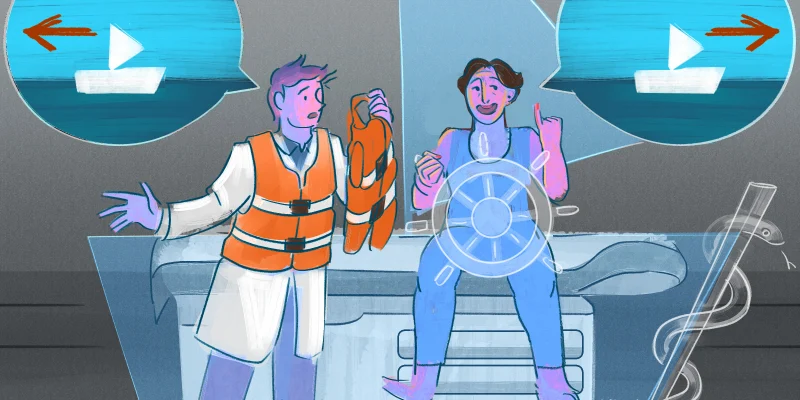What’s the hardest question you’ve looked at and had no idea how to approach?
I remember when I attempted to solve for a derivative in my advanced math class in high school. “How am I supposed to do this?” I asked in frustration. It felt unnecessarily complicated for the typical person.
As an adult in a residency program, I’ve come upon a similarly hard math problem: How to decipher the equation behind medical residency salaries and how residency programs are paid.
For a long time, our pay has not been proportionate to the output and hours we provide. I have talked with numerous colleagues across the nation who express that their pay is insufficient. They all want a raise.
Why do we deserve an upgrade in salaries when we only stay in our positions for a few years? The answer is simple: Right now, clinicians are compensated by how many RVUs they generate. However, this does not reflect the value of residents’ work. We spend long hours in the hospital and clinic to provide the care that our patients need. We listen to patients, families, and communities to understand their health needs and offer emotional support. We tailor care plans and prescribe medications. We educate people on preventative measures. We diagnose and treat patients. Our perspectives were a voice during the pandemic.
While residency is temporary, pay inequity is not something that can be tolerated — even for a short time. We are valuable, and it is time that we receive fair compensation.
Sometimes, the voices of our own people can be the hindrance to progress. The older generations of physicians tell us: “You’ll get through it. It’s only a few years of your life. You’re doing a fraction of the 100-hour weeks we did back in the days, so stop complaining.” But is that a good enough reason to say that the demands of residency are not detrimental to our health and well-being, and that we should not receive adequate compensation for our work?
Don’t get me wrong, I applaud the generations who went before us. Medicine is not for the fragile mind. We sacrifice our hobbies and endeavors, time with family and loved ones, and much more to learn and competently serve the vulnerable and the sick. Our timeline in college, medical school, and now residency comes at a premium cost: not only the physical and mental drainage, but also the financial debt we incur at an average of $215,900.
The wellness among clinicians is in jeopardy, with burnout at an unprecedented level. In fact, a recent study of emergency medicine residents revealed that a whopping 76% of respondents displayed signs of burnout. This begs the question: Are all these hardships, years of training, and sacrifices worth anything? These questions about worth and compensation have roamed through my mind for some time and have sparked great conversations among my peers. While residencies have become more receptive to wellness in medicine, the financial compensation aspect has been overlooked and needs a facelift.
Over months of thinking about this, I have come up with a solution to the equation of how residents should be properly paid: Our salaries as residents should be in the same vicinity as those of our peers conducting similar levels of work. Currently, the average resident salary in the U.S. is $67,564. The average salaries for NPs and PAs, however, are $91,257 and $104,123, respectively, so the salary for residents should be in that vicinity when they are starting off their careers.
Below, I propose a model for compensating residents (and fellows) within the same organization based on a multifactorial net system. The idea, while complicated in theory, can still be applied in practice: If someone has a similar score as another, the compensation should be balanced. The model is an attempt to pay fairly across the board of health care workers taking care of patients.
Years of Experience in the Field, Post-Schooling
- 0-4: 1 point
- 5-9: 2 points
- 10-14: 3 points
- 14 or more: 4 points
Risk for Legal Scrutiny or Liabilities
- Rarely: 1 point
- Occasionally: 2 points
- Often: 3 points
- Always: 4 points
Level of Responsibilities
- Employee assists with a specific part of the patient's problem: 1 point
- Employee provides help with the overall plan and treatment: 2 points
- Employee provide specialized recommendations to the principal clinician: 3 points
- Employee is the principal clinician who makes the final decisions: 4 points
Level of Acuity of Care
- Stable: 1 point
- Moderate risk: 2 points
- Complex: 3 points
- High risk: 4 points
Financial Benefit for Organization
- The system employee works for gets paid minimally for their service: 1 point
- The system employee works for gets paid average for their service: 2 points
- The system employee works for gets reimbursed well for their service: 3 points
- The system employee works for gets reimbursed exceptionally well for their service: 4 points
Scarcity of Specialty
- Low demand, high supply: 1 point
- Low demand, low supply: 2 points
- High demand, high supply: 3 points
- High demand, low supply: 4 points
Level of Productivity
- Employee provides the minimum level of productivity in their role: 1 point
- Employee provides a reasonable amount of productivity: 2 points
- Employee is efficient at their job: 3 points
- Employee goes above and beyond: 4 points
*Average: the median level across those who work within the same organization. Those with the most points would be at the top 1% of the group in terms of compensation.
This rubric is the tip of the iceberg; there are many additional solutions that can create an atmosphere of respect and value for our residents. Below, I propose a few alternatives, of varying degrees of difficulty to implement:
CMS:
- Hospitals should bill residents’ work and set with CMS and insurances a comparable rate like they would for practitioners. In doing so, they will increase the salaries for residents.
- Funding from CMS should directly go into the pockets of residency programs and, in particular, the residents.
Shift Length:
- Salaries for residents should increase after working overtime (more than 40 hours).
- Currently, over 66% of residents work more than 50 hours a week on average. To mitigate this, the number of hours during residency should be limited to 60 per week, and a five-day workweek should be implemented.
Pay:
- Residents should be paid hourly for their work, with no cap. If a hospital system can afford to pay residents more than a competing residency, this should be permissible.
Program Benefits:
- Increase work benefits to balance residents’ efforts, including complementary meals, parking privileges, and affordable housing.
- Increase the number of vacation days and PTO.
- Contribute to a percentage of residents’ medical school loans.
I hope this article ignites a conversation about equal pay for residents. We have dedicated over a decade of our lives to studying medicine and training to be competent clinicians. Our system must be adjusted to account for the value, sacrifices, and long hours we bring to the work of health care.
How would you remodel the salary foundation of residency? Share your ideas in the comments below.
Dr. Ricardo Chujutalli is a family medicine resident in Orlando, FL. He enjoys reading, playing chess, and exercising. He received his Masters in Business Administration from La Sierra University and Masters in Bioethics from Loma Linda University. Dr. Chujutalli is a 2022–2023 Doximity Op-Med Fellow. The views in this article do not reflect the institution he works for and are are his own.
Illustration by Jennifer Bogartz







